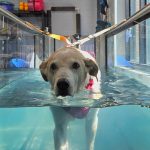FIRST AID KITS FOR PETS
FIRST AID KITS FOR PETS
If you have a pet, it is very important to have a basic first-aid kit for home and when traveling with your pet. You can create your own or visit your nearest pet store or online pet store to purchase a pre-made kit. Assembling your own can be quite easy and will allow for customization based on your pets’ needs. You can start building your kit by purchasing a first-aid kit designed for humans then add pet-specific items to it. Here are a few items that the Humane Society suggests to consider adding to your kit:
- Absorbent gauze pads
- Adhesive tape
- Alcohol pads
- Antiseptic wipes, lotion, powder or spray
- Blanket (a foil emergency blanket)
- Cotton balls or swabs
- Gauze rolls
- Hydrogen peroxide
- Ice pack
- Non-latex disposable gloves
- Rectal thermometer (your pet’s temperature should not rise above 103°F or fall below 100°F)
- Scissors
- Sterile saline solution
- Tweezers
- Phone numbers: your veterinarian, the nearest emergency-veterinary clinic (along with directions) and a poison-control center or hotline (such as the ASPCA poison-control center, which can be reached at 1-800-426-4435)
- Paperwork for your pet (in a waterproof container or bag): proof of rabies-vaccination status, copies of other important medical records and a current photo of your pet (in case he gets lost)
- Nylon leash
- Self-cling bandage
- Muzzle or strips of cloth to prevent biting
Other:
- Benadryl for allergic reactions. (1mg/1 lb. of body weight every 8 hours) (ie. 50 lb. dog would take 2 25mg tablets)
- Ear-cleaning solution
- Glucose paste or corn syrup (for diabetic dogs or those with low blood sugar)
- Nail clippers
- Non-prescription antibiotic ointment
- Penlight or flashlight
- Plastic eyedropper or syringe
- Pre-soaked alcohol pads
- Splints and tongue depressors
- Styptic powder or pencil
- Temporary identification tag
Include any other item that is specifically recommended by your vet and be sure to update your kit occasionally and replace items that have expired. Keep the kit in a safe, cool, dry place away from children and pets. If you have any questions or have specific needs for your pets’ kit, please contact us at Independence Veterinary Clinic.









